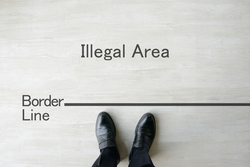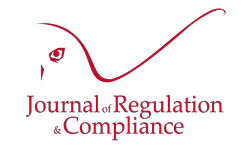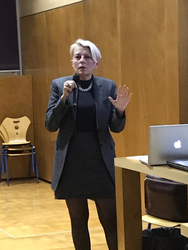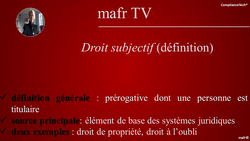The recent news
Feb. 12, 2020
Teachings : Banking and Financial Regulatory Law, spring semester 2020

Résumé de la leçon : Dans une conception classique et du Droit et du "libre marché", le principe est la liberté d'action de la personne. Même si l'exercice de cette liberté, voire d'un droit subjectif peut causer un dommage, par exemple un dommage concurrentiel, c'est en quelque sorte le prix légitime d'une société libre et concurrentielle. Ainsi dans une conception libérale, seul l'abus est sanctionné, c'est-à-dire l'exercice fautif que l'on fait de sa liberté ou de son droit, allant parfois jusqu'à l'exigence d'une faute qualifiée.
Mais les secteurs bancaires et financiers ne sont pas gouvernés par le principe de libre concurrence. Ils sont gouvernés par le principe de régulation, le principe de concurrence n'y a qu'un rôle adjacent. Cela ne pourra qu'engendrer de graves difficultés lorsque le Droit de la concurrence et le Droit bancaire et financier font s'appliquer d'une façon cumulée ou confrontée sur une même situation.
Les marchés financiers sont construits sur le principe de régulation qui pose le principe de transparence et de partage d'une information exacte : c'est ainsi que l'intégrité des marchés financiers est assurée, l'Autorité des Marchés financiers en étant le gardien.
La prévention et la sanction des "abus" de marché est donc non pas une part résiduelle du Droit financier, mais un pilier de celui-ci, contrairement au Droit des marchés ordinaires concurrentiels, sur lesquels l'opacité et le non-partage des informations est la règle.
Cela explique l'état du droit des "abus de marché", dont l'effectivité de la prohibition est essentielle pour le bon fonctionnement ordinaire des marchés financiers. Leur prohibition nationale a été harmonisée par le Droit de l'Union européenne, à travers des textes dont les signes reprennent l'appellation anglaise : Market abuses (ainsi le nouveau Règlement communautaire sur les abus de marché est dit Règlement MAR (Market Abuses Regulation) et la directive qui l'accompagne MAD (Market Abuses Directive) .
Il sanctionne un certain nombre de comportements, qui portent atteinte à l'intégrité des marchés,
Mais il n'exprime plus des exceptions par rapport à un principe : des fautes par rapport à des libertés ou à des droits. Il exprime des moyens par rapport à des principes dont la sanction des abus ne constitue que la concrétisation de principes dont ils sont la continuité même : l'efficacité du marché, son intégrité, sa transparence, l'information de l'investisseur.
C'est pourquoi la sanction des abus de marché ne sont pas du tout un phénomène périphérique par rapport à la Régulation des marchés financiers et à l'activité et au fonctionnement des bancaires, comme l'est le Droit pénal : elle est au contraire à la fois ordinaire et centrale. Cette différence des deux ordres publics va se retrouver dans la question lancinante de la sanction pénale et de la sanction administrative des mêmes abus de marché (par exemple "manquement d'initié" et "délit d'initié", qui ont tendance à se cumuler dans des techniques de répression qui seront l'objet de la prochaine leçon.
_____
Accéder aux slides servant de support à la leçon sur les abus de marché.
Revenir aux bases avec le Dictionnaire bilingue du Droit de la Régulation et de la Compliance.
Documentation de base, spécifique à la leçon
Doctrine
- Barrière, F., La cybercriminalité boursière, 2020,
- Boursier, M.-E., L’irrésistible ascension du whistleblowing en droit financier s’étend aux abus de marché , 2016,
- Conac, P.-H., La loi du 21 juin 2016 réformant le système de répression des abus de marché , 2016,
- Frison-Roche, M.-A., L'impossibilité d'unicité juridique de la catégorie des lanceurs d'alerte, 2020,
- Frison-Roche, M.-A., Vers une conformité au droit européen, in "Conformité, Entre prévention et sanction", 2015.
Textes
- Règlement de l'Union Européenne sur les Abus de Marché , 2014 (entré en application le 3 juillet 2016)
- Loi du 21 juin 2016 réformant le système de sanction des abus de marché
- Article 465-1 du Code Monétaire et Financier
- Soft Law
- Autorité des marchés financiers, La cybercriminalité boursière, 2019
- CEDH, 4 mars 2014, Grande Steven c/ Italie,
- Conseil const., 18 mars 2015, EADS,
- Cour d'appel de Paris, 7 mars 2000, KPMG,
- C.E., 20 juin 2016, Société Bryan A. c/ AMF
- AMF, 25 avril 2019, Iliad
- AMF, 11 décembre 2019, Bloomberg
- AMF, 4 décembre 2019, Morgan Stanley
- France Culture, La dimension criminelle des crises, 7 février 2018
______________
Approfondir par la Bibliographie générale du Droit de la Régulation bancaire et financière
Revenir à la présentation générale du Cours.

Feb. 4, 2020
Organization of scientific events

The cycle of conferences Les outils de la Compliance (The Compliance tools) began in November 2019 and runs until June 2020. It is organized by The Journal of Regulation & Compliance and all of its partner universities. It includes a conference more particularly devoted to the theme of "La prégnance géographique dans le choix et l'usage des outils de la Compliance" ("Geographic significance in the choice and use of Compliance tools").
Conference and Debate (in French)
Thuesday, February 4, 2020, 16h30– 19h30
Law & Political Sciences School
Doyen Louis Trotabas Avenue, 06050 Nice Cedex.
Amphithéâtre Bonnecarrère, Villa Passiflore,
General Presentation:
Compliance is a global phenomenon. In this, it illustrates the problematic of a Global Law. However, it should not be inferred that Compliance is applied in the same way everywhere in the world. Like any legal institution, it is integrated into a preexisting legal framework, shaped by culture and history.
The aim of the conference is to explore geographic significance in Compliance Tools, that is to say the potentially different way in which these tools are chosen and used depending on the geographic area concerned. The three geographic areas studied will mainly be Europe, the United States and Africa. Opportunity will thus be given to highlight the convergences and divergences in the implementation of Compliance Tools in a geographic vision of the institution.
Under the scientific direction of Jean-Baptiste Racine, professor at the University Côté d'Azur (Law & Political Sciences School of Nice), GREDEG-CREDECO, CNRS UMR 7321
With the interventions of:
- Jean-Baptiste Racine, professor at the University Côté d'Azur , Nice
- Mahmoud Mohammed Salah, Law professor at the University of Nouakchott, Mauritany
- Karen Coppens, Dechert LLP
- Mads Andenas, Law professor at the University of Oslo, Norway
- Marie-Anne Frison-Roche, Law professor at Sciences Po, Paris
____
_________
Read the registration procedure for this conference.
Consult the gele calendar of upcoming events.
Consult the presentation of the book to be published "Compliance Tools".
Go back to general presentation of the Conferences' cycle "Compliance Tools".
Inscription : anouk.leguillou@mafr.fr
_________
Feb. 4, 2020
Conferences
THE TOOLS OF COMPLIANCE AND THE THEORY OF CLIMATES, IN "GEOGRAPHICAL PREGNANCE IN COMPLIANCE TOOLS "

Complete reference : Frison-Roche, M.-A., The tools of Compliance and the Theorie of Climates, in "Geographical pregance in Compliance Tools" (Les outils de la Compliance et la Théorie des climats, in La prégnance géographique dans les outils de la Compliance), February 4, 2020, Nice.
Conference Summary: Starting from Montesquieu's "climate theory", affirming that human beings would be of a different nature in different places of the world, which therefore requires different rules of government according to these places, a theory which echoes the geographical confinement that Pascal operated on the Laws, we can think that, as with any rule, Compliance legal rules, which ensure compliance of the behavior of human beings to the rules, this will vary depending on whether we are below or beyond the Pyrenees. But on this geographical dimension so natural one can on the contrary and at first doubt. Indeed, by presenting it as a simple process, which artificial intelligence based on algorithms could fully take care of, by its absence of substance this dimension loses all relevance. Except falling into the other excess consisting in posing that everything is only a question of "pure compliance culture" or that this is only the dressing of a pure balance of power, between geographical areas, for example the United States and Europe, and in this Law of palisade geo-politics is to such an extent that it would have devoured Law.
It is necessary to keep the measure of things and on the contrary organize in a second time a kind of triptych and firstly find what comes from the accumulation of technical and immutable information, secondly what comes from local phenomena but requieres global standards of compliance which can be technically attached because of their "crucial nature" and thirdly also assume "political pretensions of monumental goals" which contest the borders and the branches of the Law which guard these.
If we manage to do this, then Compliance Law not only manages to get rid of what undermines it, that is, its mechanical temptation offered by technology and its disappearance by political power, keeping substance without being violent. . Indeed by respecting geography the West does not have to dictate "its" law. On the contrary, it must take concrete lying to the Kanak Law, which does not define the Law as what is stated and applied, but as a 'path'. Thus in the technique of responsible investments, because the Law of Compliance is teleological, the Subject of law, that is to say the company (which is in position, for example that invests) does not prohibit but organizes the transition so that the beneficiary of the device is not himself sanctioned, for example abandoned to corruption, but accompanied towards the exit of the system. The integration of time and the concept of 'duration', common to compliance law and regulation law (the Law of Compliance being the internalisation of Regulations in entities capable of implementing them) involving the articulation between the territory and duration (which is not permitted by Competition Law).
Read the presentation of this conference on the Geographical pregnance in Compliance Tools
See the other conferences of the complete cycle on Compliance Tools.
Read the general presentation of the conferences cycle.
Read the working paper which is the basis of this conference.
Consult the slides on which the conference is based (in French).
Summary : Starting from Pascal's "climate theory", one might think, as with any rule, Compliance, which ensures that human behaviour conforms to the rules, it varies, depending on whether one is "below or beyond the Pyrenees". . But of this geographical dimension so natural, on the contrary and at first one can doubt. Indeed by presenting Compliance as a simple process, which artificial intelligence based on algorithms could fully support, by its absence of substance this geographical dimension loses all relevance. Except to fall into the other excess of asking that everything is only a matter of 'compliance culture' or that it is the dressing of a pure balance of power, between geographical political areas, for example the United States and Europe, and in this Law of façade the geo-politics is at this point all that it would have devoured Law.
We need to keep Reason, instead organizing a kind of tryptic and find what is the accumulation of technical and immutable information, which is local phenomena but to which standards of global Compliance can be technically attached because of their "crucial nature" and also assume "political pretensions of monumental goals" that challenge the borders and branches of Law that guard them.
If we manage to do this, then not only Compliance Law manages to get rid of what undermines it, that is its mechanical temptation offered by technology and its disappearance by political power, keeping substance without being violent. . Indeed by respecting geography the West does not have to dictate "its" Law. On the contrary, it must take concrete conception, borrowing to Kanak Law, which does not define Law as what is stated and applied, but as a 'path'.
Thus in the technique of responsible investments, because Compliance Law is teleological, the subject of law, that is to say the company (which is in position, for example to invests) does not prohibit but organizes the transition so that the beneficiary of the device is not himself sanctioned, for example abandoned to corruption, but accompanied towards the exit of the system of corruption. The integration of time and the concept of 'duration', common to Compliance Law and Regulation Law (the Law of Compliance being the internalisation of Regulations in entities capable of implementing them) involving the articulation between the territory and duration (which is not the rule of Competition Law).
Jan. 29, 2020
Teachings : Banking and Financial Regulatory Law, spring semester 2020

Résumé de la leçon n°1. La "Régulation" ne se confond pas avec la "réglementation". Elle constitue un "Droit" spécifique, dont la "réglementation" n'est qu'un outil, comme le sont les lois, les décisions de justice, etc., qu'ils soient obligatoires (hard Law) ou pris en considération par ceux qui sont concernés (soft Law). La "Régulation" ne se confond pas davantage avec la "Supervision", avec laquelle elle se cumule, en matière bancaire et financière. Ainsi, en-deçà des multiples Codes, par exemple le Code monétaire et financier, ce sont avant tout les Autorités de régulation et de supervision qui fabriquent et font vivre ce "Droit de la Régulation bancaire et financière".
Il convient donc de débuter par les institutions françaises : l'Autorité des marchés financiers (AMF) et l'Autorité de contrôle prudentiel et de résolution (ACPR).
Ces autorités sont elles-mêmes ancrées non seulement entre elles et entremaillées au niveau européen, dans des relations internationales constantes, mais encore elles sont ancrées dans le système juridique français, lequel se déploie entre les deux ordres de juridictions, juridictions judiciaires et juridictions administratives, substantiellement unis autour des principes constitutionnels, et s'ancre dans l'ordre de l'Union européenne. Mais de fait, parce que la banque, et plus encore la finance, ne sont pas contenus dans les frontières des systèmes juridiques, le Droit américain, plus proche du Droit britannique (Common Law) que du Droit européen continental (Civil Law) dont la France et l'Allemagne demeurent l'expression, demeure la source première d'influence.
Après avoir fixé quelques définitions et avoir rappelé le raisonnement privilégié en Droit de la Régulation, prenant l'une puis l'autre, la description de l'AMF, qui succéda à la COB, née en 1967 par copie de la SEC américaine, suppose que l'on expose son statut, sa composition, ses pouvoirs et les contrôles dont elle est l'objet.
De nombreux modèles institutionnels existent et on les expérimente les uns après les autres. Le secteur des banques et des assurances continue d'être régulé par une Autorité adossée à la Banque de France, l'ACPR, dont il convient de faire une semblable description.
Revenir aux bases avec le Dictionnaire bilingue du Droit de la Régulation et de la Compliance.
Documentation spécifique à la leçon :
- Règlement général de l'Autorité des marchés financiers
- Présentation de l'AMF par elle-même
- Présentation de l'ACPR par elle-même
- La mission de la BCE vue par elle-même
- Loi du 20 janvier 2017 portant statut général des autorités administratives indépendantes et des autorités publiques indépendantes
- Présentation de l'application mondiale et contestée du FCPA
Approfondir par la Bibliographie générale du Droit de la Régulation bancaire et financière
Revenir à la présentation générale du Cours.
Se reporter au plan général du Cours.

Jan. 29, 2020
Organization of scientific events

The cycle of conferences Les outils de la Compliance (The Compliance tools) began in November 2019 and runs until June 2020. It is organized by The Journal of Regulation & Compliance (JoRC) and all of its partner universities. It includes a conference more particularly devoted to the theme of "Les expertises requises dans l'Ex Ante de la Compliance" ("The expertises required in the Ex Ante of Compliance").
Conference – Debate
Wednesday, January 29, 2020, 18h30-20h
in the amphitheater of the Paris Chamber of Commerce and Industry
Friedland Avenue, 27, 75008 Paris
General Presentation
After examining various specific tools, such as Risk mapping or Incentives, these showing that the tools only have their efficiency through their use designed and carried out by human beings, endowed themselves with the required expertise. But it is often because it is very difficult to identify and define these "skills" that operators subject to the Ex Ante Compliance obligations end up entrusting this observance to machines, via Compliance by Design ...
The mass of what should actually be observed leads to favoring massification expertise, as the "Regtech" handle it. But the rules being a living thing, Company Law adjoins Governance and one must know both. In the same way as the mastery of Ex Ante supposes that one always thinks of Ex Post (sanction for failure in the Ex Ante), so that this Ex Post does not appear, under its unwelcome face of Repressive Law which therefore must be anticipated and therefore present in Ex Ante.
In the same way, Tax Compliance presupposes that the State must be present in the good technical conception of Compliance. Compliance being the means by which States internalize their "monumental goals", or even confront each other under the mask of companies, it is then international policies in question, and this political expertise is required in Ex Ante.
_________
under the scientific direction of Marie-Anne Frison-Roche, professor fo Regulatory Law Compliance Law at Sciences Po.
with :
- - Antoinette Gutierrez-Crespin, partner, department Forensic & Integrity Services EY France.
- François Barrière and Sidne Koenigsberg, Skadden
- Pierre Vimont, Senior Fellow, Carnegie Europe
- Benjamin Jean, president of Open Law
- Thomas Amico, Linklaters
________________
-
Read the registration procedure for this conference.
Consult the general calendar of upcoming events.
Consult the presentation of the book to be published "Compliance Tools".
Go back to general presentation of the Conferences' cycle "Compliance Tools".
Inscription : anouk.leguillou@mafr.fr
Jan. 29, 2020
Teachings : Sectoral Regulatory Law 2019-2020

Cet enseignement se déroule au semestre de printemps 2020, à la suite du cours semestriel qui a porté sur le "Droit commun de la Régulation".
Comme pour celui-ci, il est entièrement assuré par Marie-Anne Frison-Roche, professeur d'Université, titulaire à Sciences po.
Comme les étudiants qui n'ont pas suivi ce cours, il est important de se reporter au matériau du cours de Droit commun de la Régulation. Dans la mesure où il est le prolongement de ce cours qui, en raison des nombreux retours des principes de droit commun dans diverses matières juridiques, s'est souvent éloigné du Droit de la Régulation, cette consultation peut demeurer utile même pour les étudiants ayant suivi ce premier cours.
Ce Cours de Droit sectoriel de la Régulation vise à montrer la spécificité de tel et tel secteurs. Il ne peut les examiner tous mais il s'agit de mesurer à quel point les spécificités sectorielles imprègnent les règles. Ainsi chaque secteur est à la fois gouverné par des règles communes à tous (ce "droit commun") et par ce qui lui est propre, sans doute avant tout ce qui est afférent à l'objet technique lui-même (le rail, le téléphone, la monnaie, etc.). Le Cours fait place également à la "régulation du numérique", bien que l'espace digital ne puisse plus guère être analysé comme un "secteur", ni en conséquence sa régulation comme une "régulation sectorielle". Cette question sera reprise dans le semestre 3 d'automne dans le cours-séminaire de Droit de la Compliance .
Ce livret détaille la façon dont les étudiants, qui suivent cet enseignement situé dans l'École d'affaires publiques de Science po, sont évalués afin de valider cet enseignement. Il précise la charge du travail qui est demandé.
Les thèmes des leçons qui composent successivement le cours sont énumérés. Comme il s'agit d'une perspective thématique les bibliographies sont insérées dans les leçons et non plus dans une bibliographie générale, laquelle allait de soi pour la présentation du "Droit commun de la Régulation" et peut continuer un intérêt dans une perspective sectorielle..
A partir de ce livret, chaque document propre à chaque leçon est accessible.
Voir ci-dessous plus de détails sur chacun de ces points, ainsi que la liste des leçons et les annales des sujets d'examen.
Jan. 20, 2020
MAFR TV : MAFR TV - definition

Regarder la vidéo définissant le Droit subjectif

Jan. 17, 2020
Publications

This Working Paper written in English is the basis for an article published in French in the French journal Dalloz Avocat , in March 2020.
Summary of the working Paper.
If we perceive Compliance Law as an aggression of the private company and a binding set of mechanisms that have no meaning and added value for it, then the attorney has a utility: defending the business. It can do so not only during the sanctions phase, but also to prevent it.
But this function is not central.
It becomes so if we understand Compliance Law as a body of substantial rules, pursuing a "monumental goal": the protection of the person, goal injected by political bodies and taken up by the operator. From this, the company must convince everyone to take it back, inside the company and outside. In a general and contradictory debate, the attorney carries this conviction, because he and she is always convincing those who at the end judge (market, public opinion, etc.) that is their raison d'être.
(In this short document, the pop-ups refer to the different works that develop each of the points)